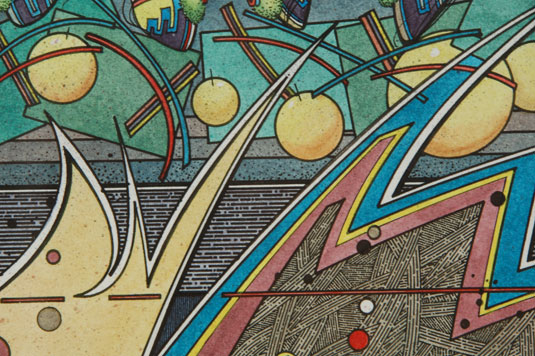Original Painting “Brokers of the Unseen” [SOLD]
+ Add to my watchlist Forward to Friend
- Category: Paintings
- Origin: Diné of the Navajo Nation
- Medium: watercolor
- Size: 7” x 10-1/2” image;
15-1/4” x 18-1/4” framed - Item # C3584E SOLD
Whitethorne’s paintings are full of activity and color. Usually they are of events on the Navajo Reservation or events of Navajo life. In this painting, the seven facial items that appear to float across the painting represent the Navajo supernatural Yei*. Interestingly, it appears that the top of the paining represents a reservation scene of a hogan covered in snow with trees around the area. The rest of the painting appears to be an underground scene? In addition to the Yei masks, there are green squares, yellow circles, zigzag elements rising from the base of the painting, and strata of earth in horizontal bands.
 The painting is signed Baje Whitethorne and dated ’89 in lower left. It is double matted and framed in a silver metal frame.
The painting is signed Baje Whitethorne and dated ’89 in lower left. It is double matted and framed in a silver metal frame.
Condition: appears to be in original condition
Provenance: from the collection of a family from California
Recommended Reading: The Biographical Directory of Native American Painters by Patrick D. Lester. This book is currently not available from Adobe Gallery.
*The Navajo yeii or yei (Navajo: yéí or yéʼii) means something along the lines of spirit, god, demon or monster. The most benevolent of such beings are the Diyin Diné'e or Holy People who are associated with the forces of nature.
Yei bichei, or "maternal grandfather of the yei", is another name of Talking God who often speaks on behalf of the other Holy People. (He, along with Growling God, Black God, and Water Sprinkler, were the first four Holy People encountered by the Navajo.) He is invoked (along with eight other male yei) in the "Night Chant" or "Nightway" (Navajo: Tłʼééʼjí), sometimes simply called "Yei bichei," a multiple-night ceremony in which masked dancers personify the gods.
A rainbow yei, sometimes considered an aspect of the rain-god Water Sprinkler, is drawn around every sandpainting; his body curls around the south, west, and north sides to protect the painting from outside influences, and to protect the user from the power of the god depicted in the painting. He does not need to cover the east, because no evil can come from the east in Navajo thought.
Definition Source: Wikipedia

- Category: Paintings
- Origin: Diné of the Navajo Nation
- Medium: watercolor
- Size: 7” x 10-1/2” image;
15-1/4” x 18-1/4” framed - Item # C3584E SOLD



